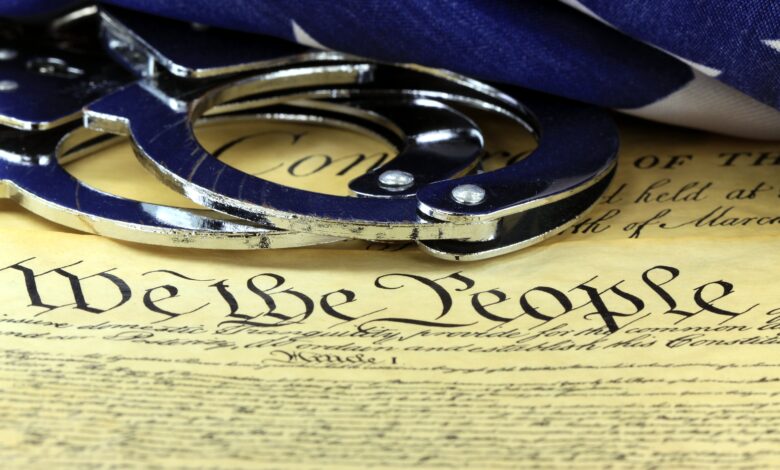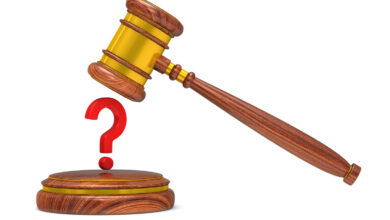In Trump Immunity Case, SCOTUS Poised to Undermine Itself

IN AGREEING TO HEAR DONALD TRUMP’S APPEAL regarding his claim that he enjoys absolute immunity from prosecution for any crimes he committed during his presidency, the Supreme Court appears to be setting the stage to solemnly pronounce that nobody, not even Donald Trump, is above the law—while at the same time placing Donald Trump above the law.
This act of judicial hypocrisy is being accomplished with a straight face and without violating any clear jurisprudential norms.
It’s not the Court’s decision to hear Trump’s appeal that threatens to place Trump above the law. There is actually a serious question buried under the mountain of bombastic nonsense presented by Trump’s lawyers.
While it is well settled that presidents enjoy a measure of immunity from civil liability for official acts, the Supreme Court has never decided whether a former president has some level of immunity from criminal prosecution for official acts and, if so, how far that immunity extends.
The argument that a president can order SEAL Team Six to assassinate his political rivals without criminal accountability after he leaves office, a hypothetical offered by an appellate judge and embraced by Trump’s lawyers, is patently ridiculous. No thinking person—a category that apparently excludes Trump and his lawyers—would take such an argument seriously.
But an argument that a former president should be constitutionally immune from criminal prosecution for some acts taken while in office isn’t entirely frivolous. It doesn’t take much of a leap of imagination to envision what politically minded state and local prosecutors might do following a Supreme Court decision that declared open season on ex-presidents. True, there is no history of politically motivated criminal prosecutions of former presidents, but that may be largely because nobody ever thought much about it, or because they simply assumed that such a prosecution would be rejected by the courts.
Getting an express hunting license from the Supreme Court could change that, and while there may be no history of criminal prosecutions of ex-presidents, there is significant history of presidents being publicly accused of committing criminal acts while in office.
In one of the more lucid sections of Trump’s petition asking the Supreme Court to review the D.C. Circuit’s denial of his claim of immunity, Trump’s attorneys point to a long history of presidents being accused of criminal behavior through their official acts: John Quincy Adams’s supposed “corrupt bargain” appointing Henry Clay secretary of state; George W. Bush’s “allegedly false claim to Congress that Saddam Hussein possessed stockpiles of ‘weapons of mass destruction’”; Barack Obama’s ordering a drone strike to kill an American citizen living abroad; Ronald Reagan’s involvement in the Iran-Contra scandal; and more.
Strong arguments—winning arguments, in my opinion—can be made that all of these examples can be distinguished from Trump’s attempts to overturn the results of a presidential election. But articulating exactly where the lines are drawn, and on which side Trump’s conduct falls, isn’t as easy as it might look on first blush.
That’s something the Supreme Court might well be asked to do.
Don’t take my word for it. Here’s what Special Counsel Jack Smith said in his petition for a writ of certiorari last December, when he asked the Court to take up this matter on an expedited basis:
While no precedent supports respondent’s claim as a former President to criminal immunity, the government acknowledges that this Court has not addressed a comparable claim. And this is a quintessential example of “an important question of federal law that has not been, but should be, settled by this Court.” [Emphasis in original.]
That is what the Court has now agreed to do, albeit belatedly. The Court will address a single question:
Whether and if so to what extent does a former President enjoy presidential immunity from criminal prosecution for conduct alleged to involve official acts during his tenure in office.
Oddly enough, that is not exactly the question that the D.C. Circuit Court teed up in its decision denying Trump’s claim of immunity. When I read the D.C. Circuit Court’s decision, I was immediately struck by what it omitted: the Court made almost no attempt to parse whether the specific acts alleged against Trump were made in his official capacity as president, as opposed to his role as a presidential candidate.
The Supreme Court is now going to look at the case under higher magnification.
By including the question of “to what extent” a former president might enjoy immunity for conduct alleged to involve official acts, the Court is telling us that it is going to take a more narrow, nuanced look at the issue than the D.C. Circuit Court did. Another clue, as Jack Goldsmith noted last week, can be found in the Court not asking about “absolute[] immunity,” which the Trump lawyers raised, but just about “immunity,” suggesting an openness to thinking about different kinds of presidential immunity. In short, the Court most likely won’t just give a gladiatorial thumbs up or down on the question of immunity, but will make distinctions and draw lines.
AND HERE’S WHERE the ironies begin to mount up, one on top of another.
We once again are entering the great debate over whether there is a sound legal basis to recognize the existence of constitutional rights (or immunities) that are not expressly granted in the Constitution.
The echo of the Court’s recent decision overruling Roe v. Wade is unmissable: The Dobbs decision boils down to the proposition that since the Constitution says nothing about a right to abortion, inferring the existence of such a right between the lines of the Constitution’s text is a bridge too far for the Court’s conservative majority.
Only this time, the justices are about to be wrong-footed.
The conservative justices who insisted that there is no constitutional right to abortion because the Constitution doesn’t expressly grant such a right are now being asked to recognize a constitutional right to immunity that, like abortion, isn’t expressed anywhere in the Constitution. And the liberal wing of the court is being asked to deny the existence of a right to immunity because the Constitution contains no express grant of such a right.
It’s enough to make your head spin.
IT’S ALWAYS DANGEROUS to try to predict exactly how the Supreme Court will resolve any given case, and this one is no exception. Whatever decision the Court reaches here will likely be a mess—a word salad, with several complicated partial concurring and dissenting opinions.
But here goes.
It seems highly unlikely that the Court will embrace either extreme here. It is unthinkable that the Court will recognize an immunity so absolute that it would encompass the SEAL Team Six scenario. Surely the justices are not so willfully blind that they will fail to see the potential hell that Trump could unleash in a second term if the Court gives him an unqualified green light. But it also seems unlikely, at least to me, that they will not recognize at least some level of immunity for official acts taken by a president in office.
To go further out on a limb, I think they will draw a line recognizing some level of limited immunity. It is possible that the justices could decide that the acts alleged against Trump were not taken in his official capacity, but it seems more likely that they will be reluctant to go that far. Instead, they more likely will articulate a standard for what kind of acts are immune from prosecution and what aren’t and leave it to the trial court to determine whether the evidence presented at trial meets that standard.
The end result may well be read—on its face—as a vindication of the principle that no person is above the law. But in context it will accomplish just the opposite.
The pages of the political calendar keep peeling away. The Court’s foot-dragging on taking up this matter—first in rejecting Jack Smith’s petition in December, then in being so slow to respond to Trump’s motion, and also in failing to schedule a more accelerated oral argument—virtually guarantees that the most serious criminal charges against Trump will not reach a verdict prior to the 2024 election. The American people deserve to have this matter resolved before the election, since Trump’s indictment for attempting to corruptly overturn the results of the 2020 presidential election is directly relevant to their decision about whether he is fit for the presidency. And if Trump wins in November, he will either pardon himself or, more likely, simply instruct his attorney general to drop the charges.
Bottom line: it looks like the Supreme Court is on a path to place Trump beyond the reach of the criminal law while at the same time piously declaring that no person is above the law.
And the justices will yet again wonder why they are held in such low esteem.




